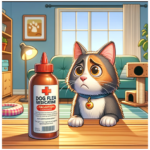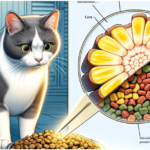
Today, we’re diving deep into a topic that’s a bit more serious than usual but important for every cat owner to understand: Feline Leukemia (FeLV).
This disease, although daunting, is something that, with knowledge and care, can be managed. Let’s explore what Feline Leukemia is, its symptoms, diagnosis, treatment, and how you can prevent it to ensure your furry friends live long, healthy lives.
What is Feline Leukemia?
Feline Leukemia Virus (FeLV) is a retrovirus that affects cats. Much like human leukemia, it’s a form of cancer that affects the blood and immune system. However, it’s important to note that FeLV is specific to cats and cannot be transmitted to humans.
How is FeLV Transmitted?
FeLV spreads through bodily fluids like saliva, blood, and to some extent, urine and feces. The most common transmission is through close contact, like grooming or sharing food and water bowls. It’s more common in outdoor cats due to their increased exposure to infected cats.
Symptoms of Feline Leukemia
The symptoms of FeLV can be quite varied, making it tricky to diagnose without testing. Some common signs include:
- Loss of appetite and weight loss
- Poor coat condition
- Persistent diarrhea or constipation
- Respiratory troubles
- Swollen lymph nodes
- Pale gums or other signs of anemia
- Persistent fever
Diagnosis and Treatment
Diagnosing FeLV involves a blood test, which can be done at your veterinarian’s office. If your cat tests positive, don’t lose hope. Many cats with FeLV live long, healthy lives with proper care.
Treatment focuses on managing symptoms and preventing secondary infections. This may include antibiotics, a nutritious diet, and regular veterinary check-ups. There’s no cure for FeLV, but supportive care can significantly improve quality of life.
Prevention: The Key to Safety
The best way to combat FeLV is prevention. Here are some tips:
- Keep your cat indoors to reduce their exposure to infected cats.
- Regularly test your cat for FeLV, especially if they go outdoors or live with other cats.
- Vaccinate your cat against FeLV. Consult your vet for the best vaccination plan.
Living with an FeLV-Positive Cat
If your cat has FeLV, it’s not the end of the world. With your care and attention, they can still lead a happy life. Here are some tips:
- Keep them indoors to prevent the spread and to protect them from infections.
- Ensure they have a stress-free environment.
- Feed them a high-quality diet and provide plenty of fresh water.
- Regular veterinary visits are essential for monitoring their health.
In Conclusion
Feline Leukemia might sound scary, but with the right knowledge and care, you can ensure your cat has a fulfilling life. Remember, early detection is key, so regular veterinary visits are crucial.
For further reading on Feline Leukemia, you can visit authoritative sources such as the American Society for the Prevention of Cruelty to Animals (ASPCA) here, or the Cornell University College of Veterinary Medicine’s detailed resource here.
Remember, a well-informed cat owner is a cat’s best friend. Stay curious and keep learning for the well-being of your feline companions!






Your articles are extremely helpful to me. May I ask for more information?
When a cat catches FIV, there isn’t a magic medicine that can make it disappear. But, we can do lots of things to help support the cat to help it feel better:
-Take your cat to the vet every 6 months to stay ahead of any potential complications.
-Make sure they get the best nutrition possible.
-Be on the lookout for exposure to any parasites or worms that could make things worse.
-Cats with FIV should not have kittens, so it’s a good idea to have them spayed or neutered.
-Keep your cat inside so they don’t catch more germs or pass the virus to other cats. If you have a multi cat household, keep the infected cat separate.
There is a vaccine for FIV, but it doesn’t work for all cats, and it can make some tests confusing later on. So, even if your cat gets the shot, keeping them safe from exposure is still super important. Talk to your vet to see if the vaccine is a good idea for your cat.
Cornell University Feline Health Center has a very comprehensive article on the subject. You can read it here.
Hope that helps!
Can you write more about it? Your articles are always helpful to me. Thank you!
Thank you for writing this post. I like the subject too.
The articles you write help me a lot and I like the topic
I really appreciate your help
Your article helped me a lot, is there any more related content? Thanks!
You’re so adept!